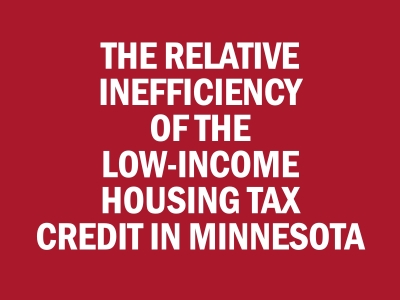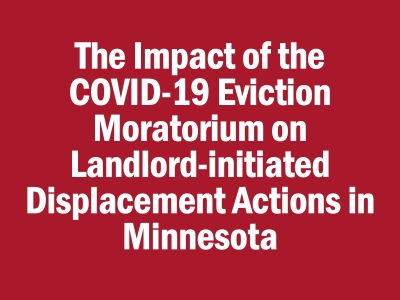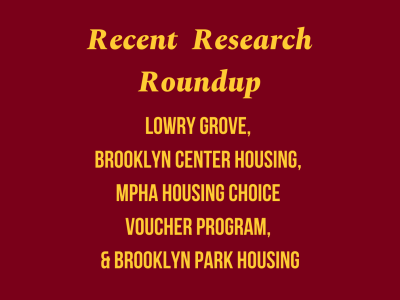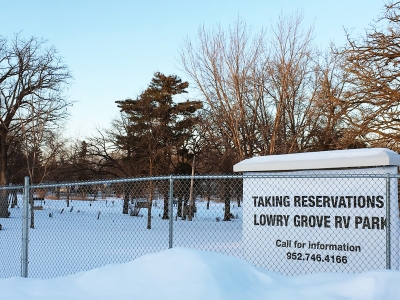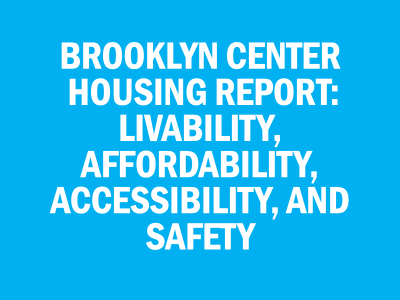Excerpted from Local Data for Equitable Communities Resource Hub, a publication of NNIP…
Presenters: Representatives from Inquilinxs Unidxs Por Justicia (United renters for Justice)
The concept of social housing is beginning to gain traction in various jurisdictions around the United States. While there is no one set definition, social housing is usually marked by permanent affordability of rental units, public ownership or control of those units, affordability for a wide range of incomes, and some level of democratic control for residents.
In some counties across Minnesota, this type of housing already exists, separate and apart from HUD-…
The CURA Housing Forum is back. This month’s forum will feature CURA researchers Dr. Anthony Damiano and Professor Edward Goetz, who will present their research on the single-family rental market in Hennepin and Ramsey counties.
The growth of investor-owned, single-family homes has become a major issue for renters in the Twin Cities and across the country. Private equity firms, real estate investment trusts (REITs), and so-called “rent-to-own” companies have come…
Executive Summary
The Low-Income Housing Tax Credit (LIHTC) is less efficient with public subsidies than other subsidized housing development programs in the State of Minnesota. Public subsidy is lost at the very beginning of tax credit deals when developers must sell the credits to investors. Historically, the market has resulted in credits being sold for 87 cents on the dollar, a loss of 13% in the value of the credit at the outset. We are unable to estimate the full cost in dollars of this leakage due to lack of data. Second, administrative costs are higher for tax credit projects than for non-LIHTC projects. We estimate a cost of up to $1.…
Community Based Research Graduate Student Project Spotlight
Fact sheet: Housing and Race in Minneapolis
Through the Kris Nelson Community-Based Research Program, Jack Gramlich (MPP '24) has supported the research and advocacy goals of the Make Homes Happen Coalition over the last year. Together, Jack and his community partner worked to produce a fact sheet that visualizes key insights on racial disparities in the Minneapolis housing market, which supports the project's broader research goal of evaluating the City's progress on meeting its housing goals.
My community partner, the Make Homes Happen Coalition, focuses on racial disparities in the…
Report submitted to the Minnesota ERASE Campaign (End Rental Arrears and Stop Evictions). ERASE is an effort to ensure that the historic aid enacted by Congress reaches the lowest-income and most marginalized renters it is intended to help. We are working to eliminate rental indebtedness caused by the pandemic, prevent evictions, and create support for long-term policy changes to end housing instability and homelessness. Co-convenors of the campaign include ACER (African Career Education Resource); Housing Justice Center, and MHP (Minnesota Housing Partnership).
Introduction…
Over the past several months, CURA has completed research projects lead by CURA Director Dr. Edward Goetz and Senior Research Associate Dr. Brittany Lewis. Each project is related to affordable housing. An excerpt from “Seeking Closure: The Lowry Grove Report” by Dr. Goetz starts the roundup, followed by three projects lead by Dr. Lewis, “The Brooklyn Center Housing Report,” “Searching for Stability,” and finally “The Brooklyn Park Housing Project.”
Seeking Closure…
CURA Director Edward Goetz will be a panelist on Rent Stabilization: Policy Choices and Impacts.
Rent-regulation policies vary widely across the United States. What do we know about their effects on rental markets, tenants, and property owners? Do differences in the policies’ design matter? ULI Minnesota and the Federal Reserve Bank of Minneapolis are partnering with experts from across the housing sector to present a four-part, virtual event series.
Learn more and register at the ULI Minnesota website.



